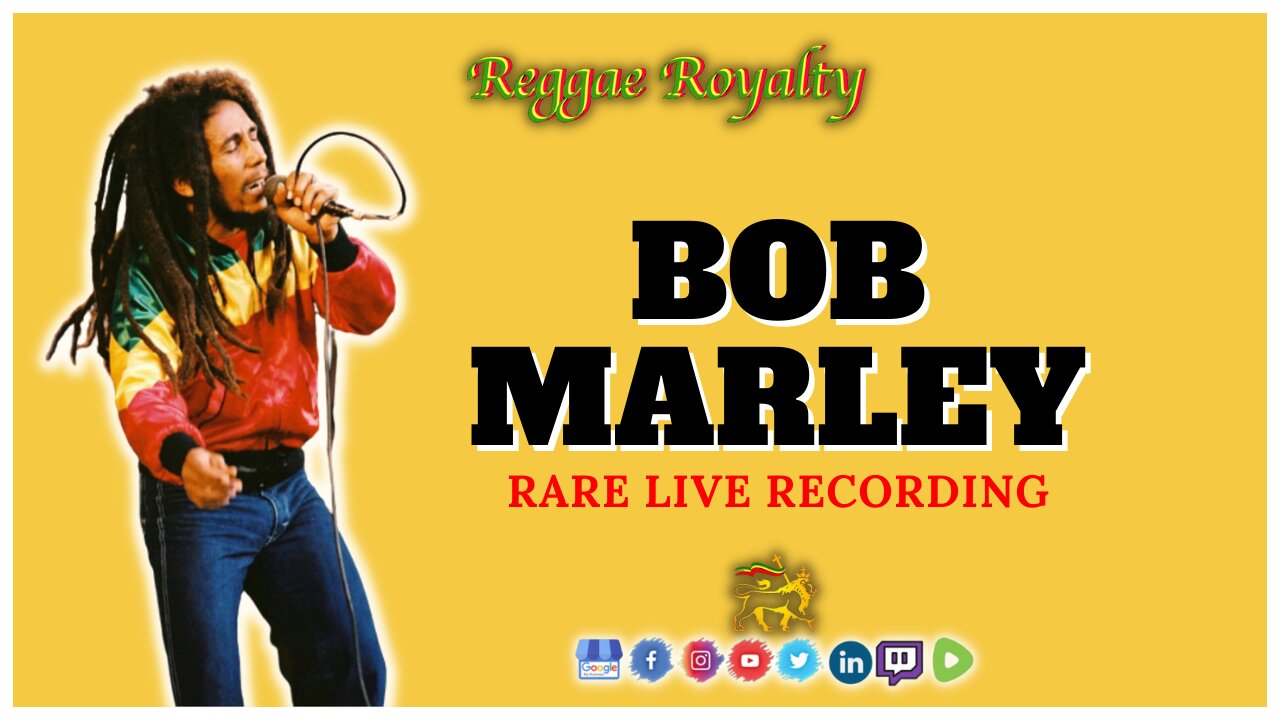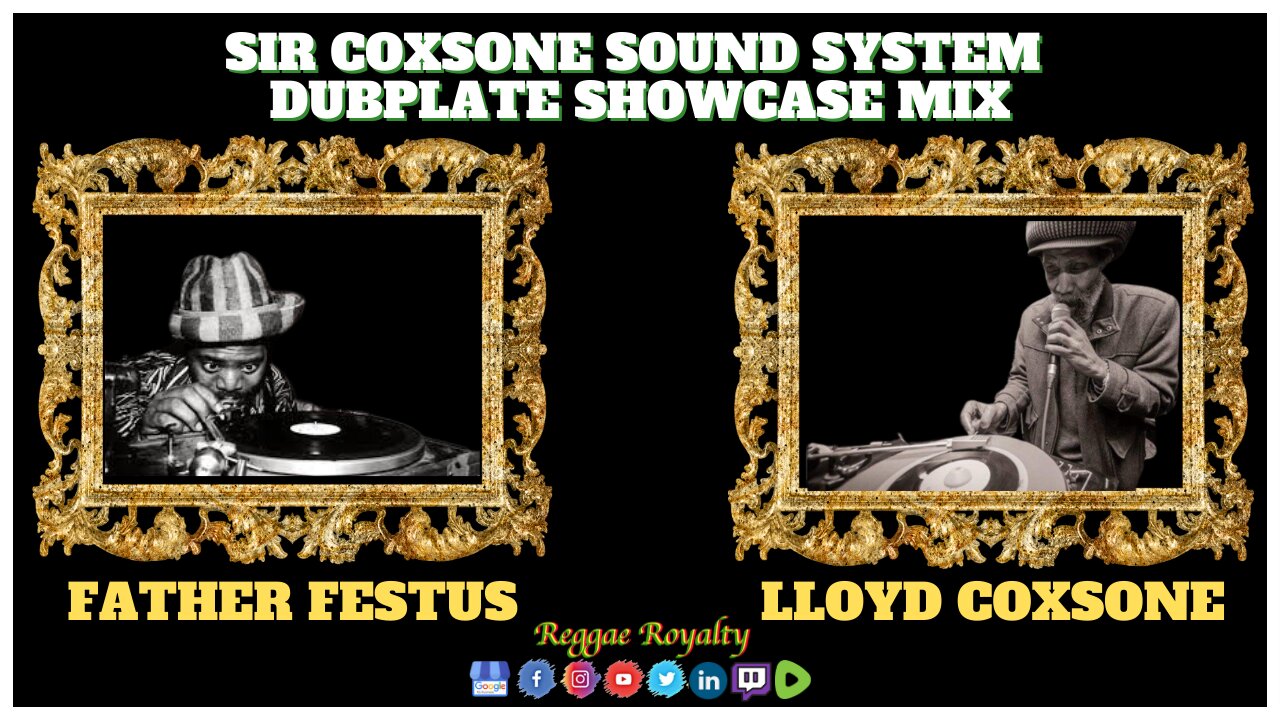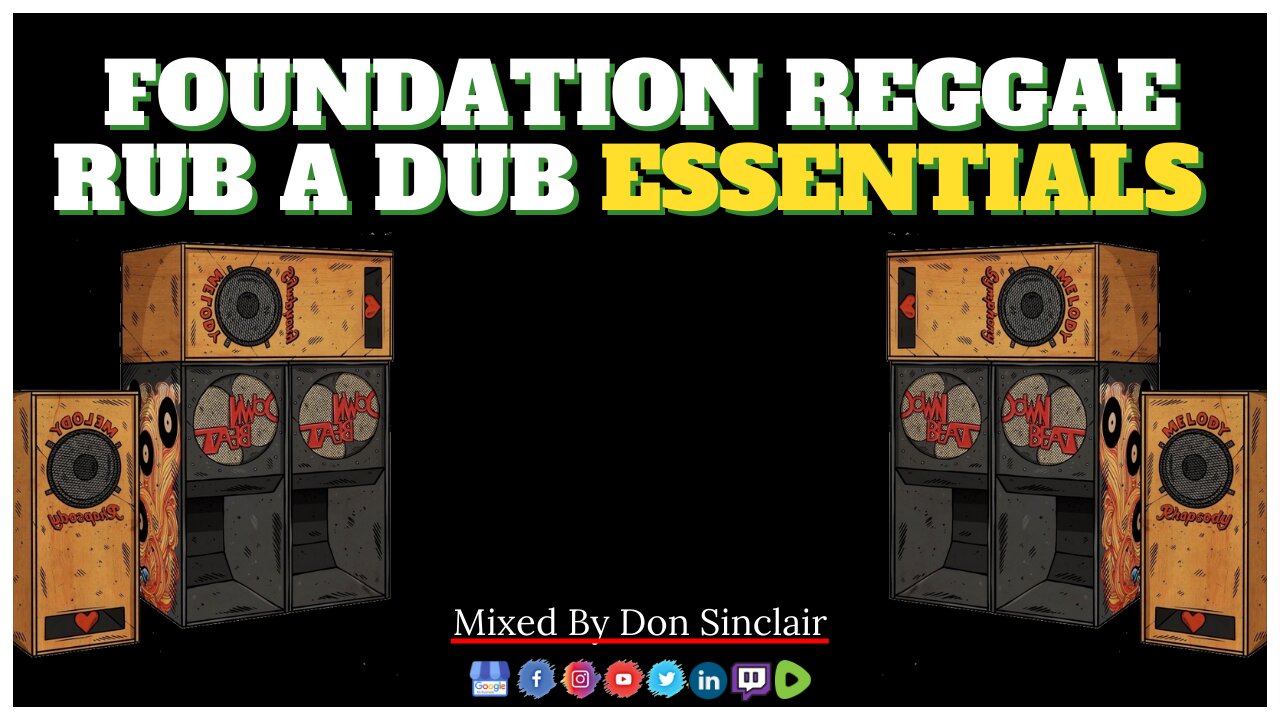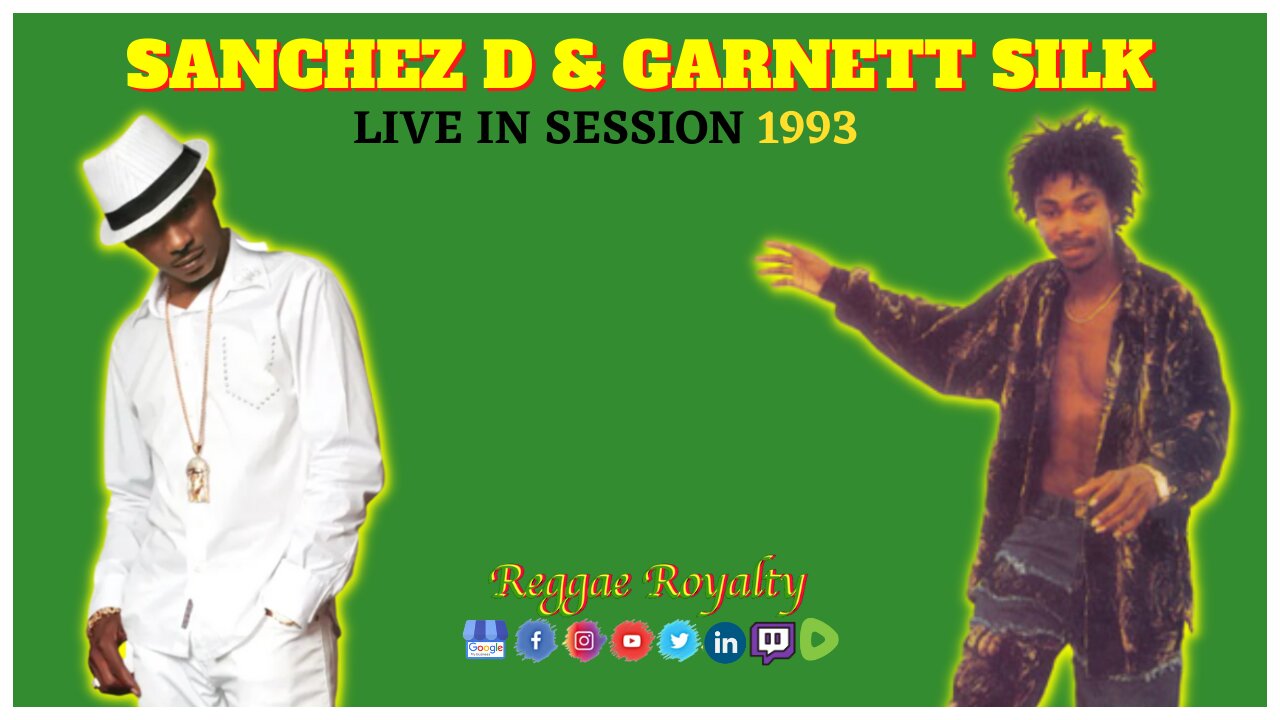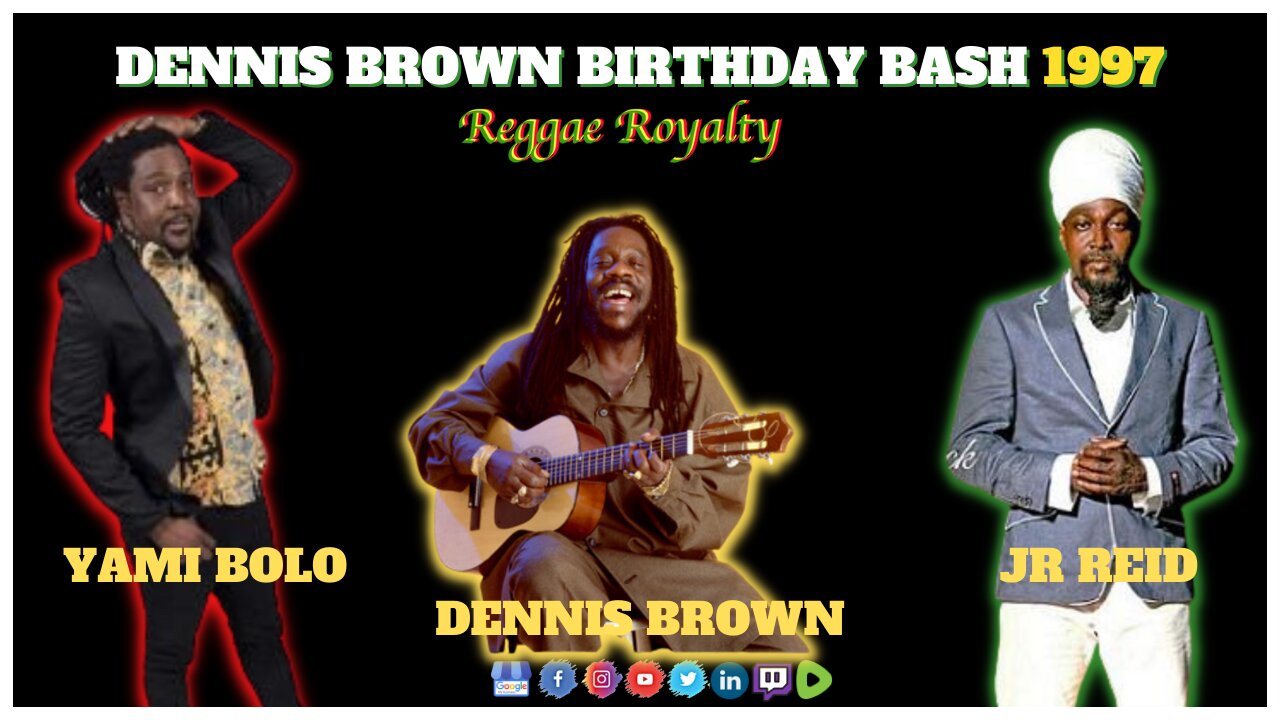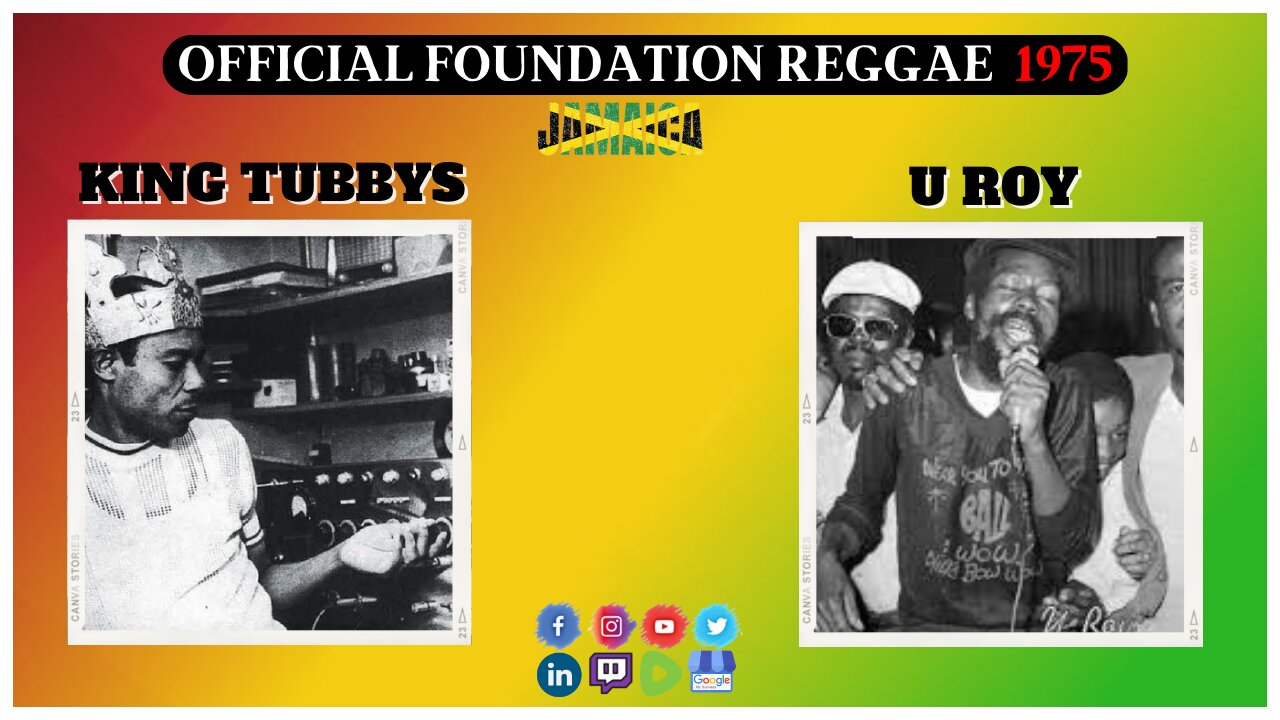Discover posts
Explore captivating content and diverse perspectives on our Discover page. Uncover fresh ideas and engage in meaningful conversations
Official Reggae Royalty Sir Coxsone Sound System - Dubplate Showcase Mix
Lloyd Coxsone & Father Festus Celebrating 50 years when they started Sir Coxsone Outernational. This Exclusive content contains Lloyd Coxsone & father Festus YouTube Studios playing vintage Dubplates and also dropping a few 2016 Exclusives.
Sir Coxsone Outernational has long been an important part of Britain’s sound system culture.
In its heyday of the 70s and 80s, the sound retained an insurmountable edge, thanks to the unbeatable tag-team of proprietor Lloydie Coxsone and his star selector, Festus, and an ever-changing crew of supporting members that kept the sound perpetually fresh and innovative. With an endless supply of superior dubplates sourced from top producers in Jamaica, augmented by some of their own productions cut with high-ranking music makers in the UK, Sir Coxsone was undeniably top of Britain’s sound system circuit. Their superior selection and the manner in which they presented it to the public gave Coxsone the kind of credibility that most other sounds were never able to achieve, leading to longstanding residencies at nightclubs in the fashionable West End.
❤️💛💚
Uk's Leading Broadcast Station for more Quality Vibes Subscribe to our NEW Platform at Rumble. com for all our latest videos.
(((( █▬█ █ ▀█▀ Subscribe, █▬█ █ ▀█▀ Like & Comment ))))
https://rumble.com/v2cmb8k-off....icial-reggae-royalty
Official Foundation Reggae Rub A Dub Essentials Music Mix
Dedicated to my Father: Papa Sinclair 🔊 🎶 🇯🇲
Foundation Reggae Rub A Dub Essentials features many great artists such as RANKING TREVOR, JOHNNY OSBOURNE, HORACE ANDY, SUGAR MINOTT, RINGO, JAH THOMAS, DENNIS BROWN, MICHAEL PALMER, plus many more...
Reggae music has been a 'major' passion in my life and just wanted to share some of my favourite music with you, So turn up the bass and take in the vibes & DONT FORGET TO SUBSCRIBE
❤️💛💚
Uk's Leading Broadcast Station for more Quality Vibes Subscribe to our NEW Platform at Rumble. com for all our latest videos.
(((( █▬█ █ ▀█▀ Subscribe, █▬█ █ ▀█▀ Like & Comment ))))
https://rumble.com/v2cwpw2-off....icial-foundation-reg
Official Reggae Royalty Sanchez D & Garnett Silk Live in Jamaica 1993
Sanchez D is a well-known reggae singer of covers—songs first recorded by other artists, often in other styles, including pop, country, and hip-hop—who has enjoyed enduring popularity despite criticism. The Encyclopedia of Popular Music revealed that Sanchez has been “critically dismissed as a cover-singing fad whose own lyrics were slight,” but that he has proven himself as a serious songwriter with such hits as “South Africa.” And while some reviewers have suggested that his singing abilities are limited, others have praised his distinctive, mellow voice. For a decade and a half, and on more than 20 albums of his own as well as those of others, his voice has leant a romantic dimension to reggae music, adapting with the genre as it has changed over the years.
Born Kevin Anthony Jackson on November 28, 1967, Sanchez began his singing career in church, then later moved into secular music. He was just six when he first sang at the church his parents attended in St. Catherine. At age 11 he was in the Sunday school choir of Rehoboth Apostolic Church, and by age 13 he was singing leads and conducting the junior choir and later the senior choir. Jackson’s taste in music changed after meeting new friends at St. Andrew Technical High School. They went to parties where sound systems—which were comprised of a deejay (or selector), music, sound equipment, technicians, Manágers, and supporters—played. Jackson discovered an affinity for the music he heard there, and he gradually replaced singing in the church choir with performing at parties.
Garnett Silk of the most exciting young talents to arise out of the '80s dancehall scene, Garnett Silk began his career as a child toaster, but ended it as one of Jamaica's most astonishing singers; with a rich and emotive voice, he took the nation by storm. He seemed destined for international stardom when his career was cut cruelly short by his death in 1996.
Born Garnett Damoin Smith in Jamaica's Manchester parish on April 2, 1966, the young DJ-to-be, had decided on his career choice as a small child. Encouraged by family and friends, Silk first took the stage at the Soul Remembrance sound system at the tender age of 12, under the moniker Little Bimbo. The tiny toaster so impressed the audience that he swiftly began DJ'ing regularly, first at Soul Remembrance, and then as the decade turned, at Pepper's Disco, Stereophonic, and then Destiny Outernational. It was at this latter sound system where the teen first met Tony Rebel, another Manchester native. Rebel was making a name for himself as a cultural toaster and went on to become a major influence on the dancehall scene, and on Little Bimbo himself. The DJ was still in his teens when he cut his first song, 1985's "Ram Dance Master"; he may have recorded others, but none have yet surfaced. It was another two years before Little Bimbo's debut single, "Problems Everywhere," appeared. Cut with producer Delroy Collins, the posthumous Journey album features not just a single, but an album's worth of material recorded by the two at this time.
Garnett Silk Meets the Conquering LionIn 1987, Little Bimbo linked up with Sugar Minott and recorded the "No Disrespect" single for the older man's Youth Promotion label. Coincidentally, Tony Rebel was at this time the star DJ for Minott's Youth Promotion sound system, and he and Little Bimbo immediately hooked back up. The pair began performing as a duo around the sound systems to much acclaim. The Garnett Silk Meets the Conquering Lion: A Dub Plate Selection album dates from about this time and features a clutch of exclusive recordings the DJ cut for the sound system from the mid-'80s through the end of the decade. Rebel, a Rastafari, eventually converted Little Bimbo to his religion with the help of dub poet Yasus Afari, a close friend of both DJs. If Rebel had a massive impact on Silk's religious beliefs and toasting themes, Derrick Morgan would have had an equal impact on his career.
❤️💛💚
Uk's Leading Broadcast Station for more Quality Vibes Subscribe to our NEW Platform at Rumble. com for all our latest videos.
(((( █▬█ █ ▀█▀ Subscribe, █▬█ █ ▀█▀ Like & Comment ))))
https://rumble.com/v2csr50-off....icial-reggae-royalty
Official Reggae Royalty Dennis Brown Birthday Bash ft Jr Reid & Yami Bolo Live & Direct 1997
One of Jamaica's most beloved and prolific artists, the late Dennis Brown has left behind a slew of classic songs and myriad hits, a rich musical legacy born of a career that spanned over 30 years. Born Dennis Emmanuel Brown in Kingston, Jamaica, in 1957, his childhood home virtually destined him for a future in the music industry. He grew up on Orange Street, the heart of the island's music scene, with most of the major recording studios a mere stone's throw away. As the stars and future hitmakers paraded by day and music pumped out of the studios, the child could not help but be entranced. It was truly serendipitous that Brown himself had a voice that would set the studios ablaze. It didn't take long for the producers to discover his talent and by the time he was 11, the youngster had a first hit to his name, with a cover of the Impressions' "No Man Is an Island." It was the beginning of a successful, but not exclusive, partnership (Brown also scored with "If I Had the World" for producer Prince Buster). However, Dodd was responsible for Brown's debut album, 1970's No Man Is an Island, and its follow-up the next year, If I Follow My Heart.
Junior Reid found himself in a difficult spot when he joined Black Uhuru in 1986. He replaced Michael Rose, who had become quite popular as a longtime Uhuru contributor. Though essentially a good vocalist, Reid's style was so close to Rose's that he didn't establish his own identity. The group also suffered compositional difficulties and personal crises during Reid's tenure. Puma Jones left and was replaced by Olafunke. They also didn't always get quality material or support from Sly and Robbie during this period. Reid departed in 1990 and began struggling as a solo artist to fulfil his considerable potential, with releases like 1991's Long Road, 1993's Big Timer, and 1996's Listen to the Voices.
International star Yami Bolo has been recording and performing "Jah-centered" cultural reggae since the 1980s. Bolo believes that he has been divinely called to make himself and his entourage revolutionary soldiers of the Almighty on a mission to spread their message of love, peace, and hope to the entire world with their performances and recordings. He is particularly interested in uplifting the youth songs that warn against violence such as "Gun War." Born Rolando McLean, Yami Bolo's earliest musical influence was church music; he began performing at age 11. He got his big chance when he hooked up with Sugar Minott and his Youth Promotion organization.
❤️💛💚
Uk's Leading Broadcast Station for more Quality Vibes Subscribe to the New Platform Rumble. com for all Our Latest Videos.
(((( █▬█ █ ▀█▀ Subscribe, █▬█ █ ▀█▀ Like & Comment ))))
https://rumble.com/v2cncn8-off....icial-reggae-royalty
Official Reggae Royalty Dennis Brown Birthday Bash ft Jr Reid & Yami Bolo Live & Direct 1997
One of Jamaica's most beloved and prolific artists, the late Dennis Brown has left behind a slew of classic songs and myriad hits, a rich musical legacy born of a career that spanned over 30 years. Born Dennis Emmanuel Brown in Kingston, Jamaica, in 1957, his childhood home virtually destined him for a future in the music industry. He grew up on Orange Street, the heart of the island's music scene, with most of the major recording studios a mere stone's throw away. As the stars and future hitmakers paraded by day and music pumped out of the studios, the child could not help but be entranced. It was truly serendipitous that Brown himself had a voice that would set the studios ablaze. It didn't take long for the producers to discover his talent and by the time he was 11, the youngster had a first hit to his name, with a cover of the Impressions' "No Man Is an Island." It was the beginning of a successful, but not exclusive, partnership (Brown also scored with "If I Had the World" for producer Prince Buster). However, Dodd was responsible for Brown's debut album, 1970's No Man Is an Island, and its follow-up the next year, If I Follow My Heart.
Now entering his teens, the singer was ready to start making the studio rounds on a regular basis, cutting songs with a clutch of different producers. The album Super Reggae & Soul Hits gathers some of his work during this period and features a mix of superb, if lightweight, covers alongside a number of self-penned classics, all cut with producer Derrick Harriott. 1975's Best Of gathered a similar selection of material recorded for Joe Gibbs earlier in the decade. In 1972, the 16-year-old entered Gibbs' Duhaney Park studio and recorded the song that later established his international reputation, "Money in My Pocket." However, it wasn't Gibbs himself who oversaw this session, but a young engineer/producer who had replaced the recently departed Lee Perry. Twenty-year-old Niney "the Observer" Holness had stunned the island two years earlier with his seminal "Blood & Fire" single, a roots classic. Now he was presented with a teenager best known for his sweet ballads and silky lovers cuts. Regardless, the two young men immediately clicked and by 1973, Brown was recording exclusively with Holness. Their work together virtually defies belief, as hits rained from the sky and the pair redefined the roots genre in their own image.
Junior Reid found himself in a difficult spot when he joined Black Uhuru in 1986. He replaced Michael Rose, who had become quite popular as a longtime Uhuru contributor. Though essentially a good vocalist, Reid's style was so close to Rose's that he didn't establish his own identity. The group also suffered compositional difficulties and personal crises during Reid's tenure. Puma Jones left and was replaced by Olafunke. They also didn't always get quality material or support from Sly and Robbie during this period. Reid departed in 1990 and began struggling as a solo artist to fulfil his considerable potential, with releases like 1991's Long Road, 1993's Big Timer, and 1996's Listen to the Voices.
International star Yami Bolo has been recording and performing "Jah-centered" cultural reggae since the 1980s. Bolo believes that he has been divinely called to make himself and his entourage revolutionary soldiers of the Almighty on a mission to spread their message of love, peace, and hope to the entire world with their performances and recordings. He is particularly interested in uplifting the youth songs that warn against violence such as "Gun War." Born Rolando McLean, Yami Bolo's earliest musical influence was church music; he began performing at age 11. He got his big chance when he hooked up with Sugar Minott and his Youth Promotion organization.
Minott was impressed by Bolo's sincerity and eventually allowed him to record special promotions for travelling DJs -- none of the many tracks he recorded with Minott was ever released. While associated with Minott, the adolescent Bolo would spend much time hanging out at Jamaican studios listening to roots beats and learning about recording. Later, Bolo performed with Stur-Mas and Third World. As an independent artist, Bolo signed with Techniques in the mid-'80s and released three singles. He then went on to cut one LP with Junior Delgado and another with Augustus Pablo before issuing the solo CD He Who Knows It Feels It for Heartbeat in 1991.
❤️💛💚
Uk's Leading Broadcast Station for more Quality Vibes Subscribe to our YouTube Channel.
Official Foundation Reggae: King Tubby's ft U Roy Kingston Jamaica 1975
King Tubby's music career began in the 1950s with the rising popularity of Jamaican sound systems, which were to be found all over Kingston and were developing into enterprising businesses. As a talented radio repairman, Tubby soon found himself in great demand by most of the major sound systems of Kingston, as the tropical weather of the Caribbean island (often combined with sabotage by rival sound system owners) led to malfunctions and equipment failure. Tubby owned an electrical repair shop on Drumalie Avenue, Kingston, that fixed televisions and radios.
It was here that he built large amplifiers for the local sound systems. In 1961-62, he built his own radio transmitter and briefly ran a pirate radio station playing ska and rhythm and blues which he soon shut down when he heard that the police were looking for the perpetrators. Tubby would eventually form his own sound system, Tubby's Hometown Hi-Fi, in 1958. It became a crowd favourite due to the high-quality sound of his equipment, exclusive releases and Tubby's own echo and reverb sound effects, at that point something of a novelty.
King Tubby's production work in the 1970s made him one of the best-known celebrities in Jamaica and would generate interest in his production techniques from producers, sound engineers and musicians across the world. Tubby built on his considerable knowledge of electronics to repair, adapt and design his own studio equipment, which made use of a combination of old devices and new technologies to produce a studio capable of the precise, atmospheric sounds which would become Tubby's trademark. With a variety of effects units connected to his mixer, Tubby "played" the mixing desk like an instrument, bringing instruments and vocals in and out of the mix (literally "dubbing" them) to create an entirely new genre known as dub music.
Using existing multitrack master tapes—his small studio in fact had no capacity to record session musicians—Tubby would re-tape or "dub" the original after passing it through his 12-channel, custom-built MCI mixing desk, twisting the songs into unexpected configurations which highlighted the heavy rhythms of their bass and drum parts with minute snatches of vocals, horns, piano and organ.
U-Roy
Known as the Originator, U-Roy wasn't the first DJ, nor even the first to cut a record, but he was the first to shake the nation and he originated a style so distinctly unique that he single-handedly changed his homeland's music scene forever. Born Ewart Beckford in Jones Town, Jamaica, in 1942, he received his famous moniker from a young family member unable to correctly pronounce Ewart and the nickname stuck.
U-Roy's rise to fame was slow and took almost a decade. He began back in 1961, DJing at Doctor Dickie's Dynamite sound system. Eventually, he moved on to the Sir Mike the Musical Thunderstorm outfit, and then in 1968 to the Sir George the Atomic sound system. The DJ was then lured away by Coxsone Dodd; however, soon tiring of playing second fiddle to longtime veteran King Stitt, he returned to Sir George. Around this same time, he met up with another royal figure, King Tubby, and then worked as a disc cutter at Duke Reid's studio. The mechanic was just beginning the musical experiments that eventually led him to develop dub, and at the moment he was giving his proto-dub experimental discs to a handful of his favourite DJs. The following year, King Tubby launched his own Hi-Fi sound system and brought in U-Roy as his top DJ. By then, the DJ had established himself as one of the premier talents of the sound system scene. Producer Keith Hudson was the first to recognize the possibilities and took U-Roy into the studio in late 1969 to cut the song "Dynamic Fashion Way." However, the tape lay in the studio while the producer went off on a trip to the U.S. and the DJ went off to try his luck elsewhere. Lee Perry paired U-Roy with Peter Tosh and recorded "Selassie," a version of Ras Michael & the Sons of Negus' "Ethiopian National Anthem." The single was originally credited to the Reggae Boys and on its subsequent reissue, under the title "(Earth's) Rightful Ruler," it was then credited to Peter Tosh and Hugh Roy, a spelling the DJ would adhere to for the next several years.
❤️💛💚
Uk's Leading Broadcast Station for more Quality Vibes Subscribe to our NEW Platform at Rumble. com for all our latest videos.
(((( █▬█ █ ▀█▀ Subscribe, █▬█ █ ▀█▀ Like & Comment ))))
https://rumble.com/v2c1xry-off....icial-foundation-reg






